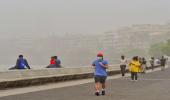'What we are seeing is some bursts of a cold wave.'
'It comes, troubles you for three-four-five-days and thereafter relaxes for another few days.'
'And then another fresh one (cold wave) comes.'

Air Vice Marshal G P Sharma (retd), President (Meteorology and Climate Change), Skymet, explains the reasons for the high temperatures in this interview with Prasanna D Zore/Rediff.com.
Is North India in the grip of extreme cold wave?
It's not very unusual. It is an extreme cold wave here. Normally, we say cold wave, but when it becomes a little graver, then we call it a severe cold wave.
When the temperature difference becomes more than close to six degrees below normal, then we call it aa severe cold wave.
It is an extreme cold wave at the moment, but nothing very unusual. We have been having these kinds of cold waves earlier also.
Even in 2021 we had a severe cold wave. What I'm saying is it's quite common. We experience these kinds of low temperatures by end of December and first half of January (every year). The same is being witnessed even this time also.
This time it is snowing in Mount Abu. Is that not unusual?
Mount Abu is a hill. So we won't compare that temperature with that of the plains. Mount Abu is located around 4,000 plus metres above sea level. The base station for Mount Abu is Abu Road which is in the plains.
Mount Abu will obviously, invariably, go to minus (temperatures below zero-degree Celsius) also at around this time. So that is not comparable with the plains. Cold wave conditions in the hills are different from those on the plains.
Therefore, we don't compare the temperatures on hills with those on the plains.
Could you give us the scientific reason why it is snowing in Mount Abu this time?
I am not sure about why it is snowing, but only when the temperatures are so low, the water vapour in the air freezes giving you a feeling of the white sheet all around; but it is not snow.
It has not snowed (in Mount Abu).
For snow, at least in the adjoining areas (of Mount Abu), there should be rain-like conditions. If there are rains then that place because of hills, we can say it has snowed because of the low temperatures. But I don't think it has snowed (in Mount Abu).
Because of very low temperatures, along with the ground frost at times in the plains of north India, which further freezes, (it) gives you a feeling of a white sheet and looks like a sheet of snow. But then it is not (snow).
How long is this cold wave likely to last?
What we are seeing is some bursts of a cold wave. It comes, troubles you for three-four-five-days and thereafter relaxes for another few days.
And then another fresh one (cold wave) comes, because it depends on the frequency of the weather systems and that frequency normally varies.
(There is) one system where the Western disturbance gives you weather activity for two to four days and then takes a break of three-four days
And then the fresh one comes. Like it has happened this time also.
Now there's a cold wave over north India because the system has moved away. Another system is coming on (January) 18 or so in the evening or night and is likely to continue till the (January) 20th, but this system will remain active only over the hills and at the most on the foothills of Punjab and Haryana.
This wave will be a little more active and spawn a secondary system that will be active over the plains and the combined together these (two waves) will give widespread weather activity over the hills and the plains simultaneously.
This system (of a cold wave across the north Indian hills and plains) could continue even till the (Republic Day) celebrations on January 26.
Will this cold wave grip Rajasthan as we see temperatures dipping below the freezing point in Sikar?
Yes. The lowest temperature seen so far has been in Rajasthan which was recorded in Churu and Sikar. Sikar has recorded the lowest temperature of minus 2.5 degree Celsius.
Though there are unrecorded observations or not very standard observations have even reported temperatures of minus 3.5 degree Celsius to 4 degree Celsius in Fatehpur Sikri. But then you have to consider observations only from standardised, automatic weather stations. Otherwise, you can put up some instrument anywhere which is not graded or calibrated officially, and obviously, we don't (should not) take those readings.
But the official and standardised temperature calibrated is at Churu, which is at minus 2.5 degree Celsius.
The weather systems over the plains and foothills of Punjab, Haryana and Rajasthan are all linked; these systems don't come in isolation.
The only thing is that the southern regions of Rajasthan will be less susceptible to these weather systems than the western and northern parts of Rajasthan.
But then cold wave has been seeping through Jaisalmer, Bikaner, Faloudi and Ganganagar and even extending to eastern parts like Sikar, Kota, Alwar, Ajmer, and Sawai Madhopur.











 © 2025
© 2025